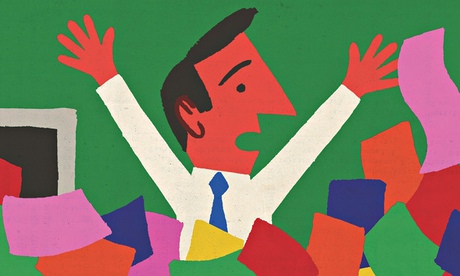
Information: there’s a lot of it about. In his new book The Organised Mind, psychologist Daniel Levitin notes that we consume five times as much as we did in 1986. He also puts it like this: if you took one person’s share of all the human-created information in the world, wrote each byte of it on an index card and spread them out, you’d blanket Massachusetts and Connecticut. (Don’t actually do this – you’d cause chaos.) But then he drops his bombshell: we’re not really suffering from “information overload” at all. Your brain is incredible at storing data; some neuroscientists believe almost everything you’ve ever experienced is in there somewhere. Which is a relief. I don’t need to worry that my ability to recall the lyrics to Joseph And The Amazing Technicolor Dreamcoat in their entirety means I’m using up space needed for something else.
But that’s little solace if it feels like you’re drowning in emails and to-do lists. Levitin agrees we have a problem – just not one of storage, but retrieval and management. The challenge is recalling the right stuff at the right time, while not being distracted by the rest. And it’s getting worse: “The information age has offloaded a great deal of the work previously done by people we could call information specialists on to all the rest of us.” Travel agents, salespeople and typing pools have been replaced by… well, you, whose job it is to find flights, figure out which fridge to buy, and answer emails. This distinction – between an overload problem and an information management problem – matters, because each entails a different solution. It’s not that we need to limit the information we consume (by quitting social media, taking digital sabbaths, for instance) but that we need better systems for organising it.
The trick, says Levitin, is to “shift the burden of organising from our brains to the external world”. Presidents and celebrities employ people to “narrow the attentional filter”, making sure they only see the stuff they need to see. But if you can’t afford an entourage, use the physical environment instead. Levitin’s specific tips might not blow your mind. One is to leave items you need to take to work on the doormat, so you’ll see them on leaving; another is to keep stacks of index cards for stray ideas and to-dos, then designate a time to gather and process them. A third is Oliver Sacks’ trick of working on different writing projects in different rooms, even different computers. (Merely having the opportunity to multitask is distracting, some experts suggest, even if you don’t succumb.) These aren’t revolutionary. Yet it’s intriguing to think of them not as one-off fixes for absent-mindedness but part of a comprehensive plan to structure how information flows through your life.
We’re called upon, in short, to be “information architects”: not to retreat from technology but to realise that “technology” means more than iPads and inboxes; it means adapting the world beyond your body to serve your goals. It’s not that there’s too much information to keep track of, but that you need to design better tracks.
• Follow Oliver on Twitter; oliver.burkeman@theguardian.com

